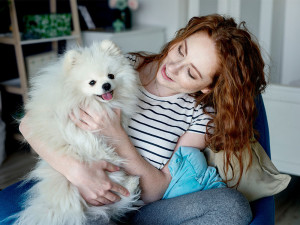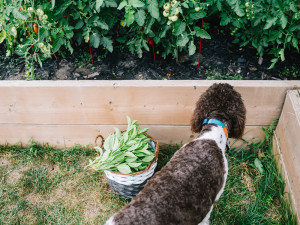How to Calculate Your Dog’s Age in Human Years
A new way to convert dog years to human years

Share Article
Maybe your 15-year-old Chihuahua still acts like a teenager or your two-year-old Great Dane is an old soul. But what is your dog’s age in human years? Turns out, we may have been barking up the wrong proverbial tree with the formula that many of us are familiar with – the simple calculation of one dog year equaling seven human years. Researchers have come up with a new – potentially more accurate – way to estimate how old your dog is compared to human years.
This revised approach to determining a dog’s age is based on the actual chemical modifications to a creature’s (human or dog) DNA over a lifetime that create an epigenetic clock – that’s a biochemical test that can be used to measure age.

Get (totally free) deals for food, treats, accessories, tech and way more pet parenting must-haves.
The researchers foundopens in new tab “that this function showed strong agreement between the approximate times at which dogs and humans experience common physiological milestones during both development and lifetime ageing, ie infant, juvenile, adolescent, mature, senior”. This translates into a seven-week-old pup equaling that of a nine-month-old child – a time by which deciduous teeth erupt in both pups and babies. They did find that dogs and humans do have similar age-related methylation of certain genomic regions, especially during ageing in both species.
How old is my dog?
The team also developed a new epigenetic clock and a formula for estimating a dog’s age in human years. Your pup’s age must be greater than one year, then that dog age is converted into a natural logarithm and that log is multiplied by 16, and then 31 added for a total.
For example, if a dog is 14 years old, the natural log of 14 is 2.6390, multiplying that by 16 equals 42.224, adding 31 brings it to 73.2.
How to translate dog years to human years
In a previous study, researchers found a way to calculate a dog’s age, while also taking size and breed into consideration since small dogs tend to live longer. In that 2013 study, they determined that small dogs age on average 12.5 years per human year, compared to 9 years for large dogs. According to this model, a Miniature Dachshund will age 4 years per human year, whereas a Bulldog will age an average of 13 years per human year. If you adopted a dog of unknown age, you can determine a dogopens in new tab’ s ageopens in new tab even if you don’t know their birthday based on physical factors like teeth, eyes, fur and muscle mass.
Recently, an article in Scienceopens in new tab about this research mentioned another group that is studying the ageing process of dogs, called the Dog Aging Projectopens in new tab, a collaborative effort of the University of Washington and Texas A&M University. It is currently collecting data from pet dogs of citizen scientists to understand how genes, lifestyle and environment influence ageing. They hope to understand why some dogs develop diseases at younger ages and die earlier, while others lead a mostly disease-free life.

Claudia Kawczynska
Claudia Kawczynska was co-founder and editor-in-chief of The Bark for 20 years. She also edited the best-selling anthology Dog Is My Co-Pilot.
Related articles
![Dog near a vegetable garden next to a basket full of a harvest]()
Tips on Dog-Safe Gardening
Garden organically, for the sake of both the planet and your dogs
![Young Woman Working From Home with Her Dog]()
10 Non-Toxic and Dog-Safe Houseplants
Brb... running out to buy air plants and succulents
![Dog chewing spiked orange toy at home]()
6 Ways to Keep Your Dog Entertained While You’re At Work
Don’t hit pause on your pet’s playtime – these solo activities will help 9–5 fly by for them
![Border Collie digging into a plate of dog food while seated at a yellow table]()
How You Can Easily Manage Your Dog’s Weight
Keep your pup’s weight down, and you could add years to their life. What’s better than that?
![Winterizing your dog's coat - Dog laying in the snow.]()
Natural Remedies for Dry Skin: How to Help Dry Skin on Dogs
Spoiler: the ingredients are probably already in your cupboard





